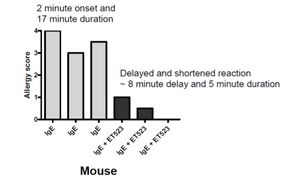Through her work with human schistosomiasis, Dr. Lisa Ganley-Leal has identified a compound that may have the ability to treat severe allergic diseases, such as a moderate to severe asthma. The new therapeutic holds the promise of improved efficacy for multiple allergic diseases combined with a lower risk of side effects. The current treatment for severe allergic asthma, in contrast, has a risk of causing anaphylactic shock and is only effective in 60-70% of patients. OTD has secured the IP in the US, Europe, and Japan. We are currently seeking a partner to continue development of this novel polyprotein therapeutic.
Dr. Lisa Ganley-Leal’s primary research focus is on defining the bona fide role of IgE in human immunity. IgE has been primarily studied in allergic disease where the antibody plays a role in generating the chronic inflammation. However, in parasitic disease, IgE has a beneficial role, namely in host resistance to infection with worms. For those infected, the parasite cleaves CD23 from the host cells’ surface, creating soluble CD23 that binds IgE, which has been found to reduce allergic reactions. The laboratory is focused on defining immune correlates of protection in human schistosomiasis including mechanisms by which IgE and IgE receptors play a role in generating protection.
Her studies in this area are in collaboration with the Centers for Disease Control and Prevention and the Kenya Medical Research Institute. To establish a mechanistic understanding of field clinical data, her laboratory developed a model system using human cells to recapitulate the inflammatory milieu of parasitic helminth disease. The laboratory has recently published papers describing novel roles of IgE in human immunity highlighted articles.
Through a collaboration with fellow BU scientist Dr. John Connor, naturally occurring soluble CD23 has been modified to bind IgE with a greater affinity in order to improve its therapeutic effect. This modified CD23 (ET523) has been tested in transgenic mice that express human IgE receptors as exhibited below. When the mice are given IgE alone, it provokes a strong allergic response. When the same mice are given the new therapeutic concurrently with IgE, the allergic response is greatly reduced. This study validates prior in vitro work, and hints at the potential for this compound to become an effective treatment for allergic diseases.
For partnering opportunities, please contact:
Harald Steltzer
Director, Business Development, Life Sciences
Transgenic mice given IgE alone or IgE together with ET523. IgE leads to intense scratching.
 In vivo test results demonstrating the effectiveness of ET523 to reduce allergic response.
In vivo test results demonstrating the effectiveness of ET523 to reduce allergic response.


One Comment
Nayan Warrior posted on July 11, 2023 at 1:23 pm
Thanks for sharing